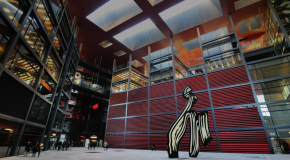Putting children first: tackling Toilet Loss
By Shivangi Jain and Dina Alborno
Schools are more than places to learn—they shape a child’s future. Yet, for millions of children worldwide, this critical environment is undermined by something as simple as access to a basic toilet.
18326
Related content

The Hinrich Foundation Sustainable Trade Index 2018
Yet the enthusiasm in Asia for trade does not appear to have waned. This broad societal consensus behind international trade has enabled Asian countries to continue broadening and deepening existing trading relationships, for example, by quickly hammering out a deal for the Comprehensive and Progressive Agreement for Trans-Pacific Partnership (CPTPP) in early 2018 following the US’s withdrawal from its predecessor in 2017.
Asia, then, finds itself in the unique position of helping lead and sustain the global economy’s commitment to free and fair trade. It is in this context that the need for sustainability in trade is ever more crucial.
The Hinrich Foundation Sustainable Trade Index was created for the purpose of stimulating meaningful discussion of the full range of considerations that policymakers, business executives, and civil society leaders must take into account when managing and advancing international trade.
The index was commissioned by the Hinrich Foundation, a non-profit organisation focused on promoting sustainable trade. This, the second edition of the study, seeks to measure the capacity of 20 economies—19 in Asia along with the US—to participate in the international trading system in a manner that supports the long-term domestic and global goals of economic growth, environmental protection, and strengthened social capital. The index’s key findings include:
Countries in Asia, especially the richer ones, have broadly regressed in terms of trade sustainability. Hong Kong is developed Asia’s bright spot, recording a slight increase in its score and topping the 2018 index. Several middle-income countries perform admirably, led by Sri Lanka. For the economic pillar, countries generally performed well in terms of growing their labour forces as well as their per-head GDPs. For the social pillar, sharp drops for some countries in certain social pillar indicators contribute to an overall decline. For the environmental pillar, with deteriorating environmental sustainability in many rich countries, China, Laos and Pakistan are the only countries to record increases in scores. Sustainability is an ever more important determinant of FDI and vendor selection in choosing supply-chain partners. Companies are improving the sustainability of their supply chains by restructuring and broadening relationships with competitors and vendors.
The Global Illicit Trade Environment Index 2018
To measure how nations are addressing the issue of illicit trade, the Transnational Alliance to Combat Illicit Trade (TRACIT) has commissioned The Economist Intelligence Unit to produce the Global Illicit Trade Environment Index, which evaluates 84 economies around the world on their structural capability to protect against illicit trade. The global index expands upon an Asia-specific version originally created by The Economist Intelligence Unit in 2016 to score 17 economies in Asia.
View the Interactive Index >> Download workbook

Breaking Barriers: Agricultural trade between GCC and Latin America
The GCC-LAC agricultural trading relationship has thus far been dominated by the GCC’s reliance on food imports, specifically meat, sugar, and cereals. Over the past two years, however, there has been a notable decline in the share of sugar imported from LAC, and 2017 saw the biggest importers in the GCC—Saudi Arabia and the UAE—impose a ban on Brazilian meat.
Market players on both sides of the aisle are keen to grow the relationship further, but there are hurdles to overcome. In this report, we explore in greater depth the challenges that agricultural exporters and importers in LAC and the GCC face. We consider both tariff and non-tariff barriers and assess key facets of the trading relationship including transport links, customs and certification, market information, and trade finance.
Key findings of the report:
GCC will need to continue to build partnerships to ensure a secure supply of food. Concerns over food security have meant that the GCC countries are exploring ways to produce more food locally. However, given the region’s climate and geology, food imports will remain an important component of the food supply. Strengthening partnerships with key partners such as those in LAC, from which it sourced 9% of its total agricultural imports in 2016, will be vital to food security in the region.
There is a wider range of products that the LAC countries can offer the GCC beyond meat, sugar and cereals. Providing more direct air links and driving efficiencies in shipping can reduce the time and cost of transporting food products. This will, in turn, create opportunities for LAC exporters to supply agricultural goods with a shorter shelf life or those that are currently too expensive to transport. Exporters cite examples such as berries and avocados.
The GCC can engage small and medium-sized producers that dominate the LAC agricultural sector by offering better trade financing options and connectivity. More direct air and sea links can reduce the cost of transporting food products, making it viable for smaller players to participate in agricultural trade. The existing trade financing options make it prohibitive for small and medium-sized players too. Exporters in LAC suggest that local governments and private companies in the GCC can offer distribution services with immediate payments to smaller suppliers at a discount.
Blockchain technology is poised to address key challenges market players face in agricultural trade. Through a combination of smart contracts and data captured through devices, blockchain technology can help to reduce paperwork, processing times and human error in import and export processes. It can improve transparency, as stakeholders can receive information on the state of goods and status of shipments in real time. Finally, it can help with food safety and quality management—monitoring humidity and temperature, for instance, along the supply chain can help to pinpoint batches that may be contaminated, minimising the need for a blanket ban on a product.
From emerging to surging: Intra-emerging markets trade and investment amid new globalisation. A brief overview.
Over the past three decades, emerging markets—a set of countries that are not too rich, not too poor and largely open to trade and investment—have harnessed free-market globalisation to achieve remarkable economic growth. This is evident from their real GDP, which has soared from US$7.41trn in 1980 to US$47.95trn in 2023. Their trade patterns have also evolved, with trade between and among emerging and developing economies now comprising over 45% of their total trade, up from 25% in 1990.1
18304
Related content

The Hinrich Foundation Sustainable Trade Index 2018
Yet the enthusiasm in Asia for trade does not appear to have waned. This broad societal consensus behind international trade has enabled Asian countries to continue broadening and deepening existing trading relationships, for example, by quickly hammering out a deal for the Comprehensive and Progressive Agreement for Trans-Pacific Partnership (CPTPP) in early 2018 following the US’s withdrawal from its predecessor in 2017.
Asia, then, finds itself in the unique position of helping lead and sustain the global economy’s commitment to free and fair trade. It is in this context that the need for sustainability in trade is ever more crucial.
The Hinrich Foundation Sustainable Trade Index was created for the purpose of stimulating meaningful discussion of the full range of considerations that policymakers, business executives, and civil society leaders must take into account when managing and advancing international trade.
The index was commissioned by the Hinrich Foundation, a non-profit organisation focused on promoting sustainable trade. This, the second edition of the study, seeks to measure the capacity of 20 economies—19 in Asia along with the US—to participate in the international trading system in a manner that supports the long-term domestic and global goals of economic growth, environmental protection, and strengthened social capital. The index’s key findings include:
Countries in Asia, especially the richer ones, have broadly regressed in terms of trade sustainability. Hong Kong is developed Asia’s bright spot, recording a slight increase in its score and topping the 2018 index. Several middle-income countries perform admirably, led by Sri Lanka. For the economic pillar, countries generally performed well in terms of growing their labour forces as well as their per-head GDPs. For the social pillar, sharp drops for some countries in certain social pillar indicators contribute to an overall decline. For the environmental pillar, with deteriorating environmental sustainability in many rich countries, China, Laos and Pakistan are the only countries to record increases in scores. Sustainability is an ever more important determinant of FDI and vendor selection in choosing supply-chain partners. Companies are improving the sustainability of their supply chains by restructuring and broadening relationships with competitors and vendors.
The Global Illicit Trade Environment Index 2018
To measure how nations are addressing the issue of illicit trade, the Transnational Alliance to Combat Illicit Trade (TRACIT) has commissioned The Economist Intelligence Unit to produce the Global Illicit Trade Environment Index, which evaluates 84 economies around the world on their structural capability to protect against illicit trade. The global index expands upon an Asia-specific version originally created by The Economist Intelligence Unit in 2016 to score 17 economies in Asia.
View the Interactive Index >> Download workbook

Breaking Barriers: Agricultural trade between GCC and Latin America
The GCC-LAC agricultural trading relationship has thus far been dominated by the GCC’s reliance on food imports, specifically meat, sugar, and cereals. Over the past two years, however, there has been a notable decline in the share of sugar imported from LAC, and 2017 saw the biggest importers in the GCC—Saudi Arabia and the UAE—impose a ban on Brazilian meat.
Market players on both sides of the aisle are keen to grow the relationship further, but there are hurdles to overcome. In this report, we explore in greater depth the challenges that agricultural exporters and importers in LAC and the GCC face. We consider both tariff and non-tariff barriers and assess key facets of the trading relationship including transport links, customs and certification, market information, and trade finance.
Key findings of the report:
GCC will need to continue to build partnerships to ensure a secure supply of food. Concerns over food security have meant that the GCC countries are exploring ways to produce more food locally. However, given the region’s climate and geology, food imports will remain an important component of the food supply. Strengthening partnerships with key partners such as those in LAC, from which it sourced 9% of its total agricultural imports in 2016, will be vital to food security in the region.
There is a wider range of products that the LAC countries can offer the GCC beyond meat, sugar and cereals. Providing more direct air links and driving efficiencies in shipping can reduce the time and cost of transporting food products. This will, in turn, create opportunities for LAC exporters to supply agricultural goods with a shorter shelf life or those that are currently too expensive to transport. Exporters cite examples such as berries and avocados.
The GCC can engage small and medium-sized producers that dominate the LAC agricultural sector by offering better trade financing options and connectivity. More direct air and sea links can reduce the cost of transporting food products, making it viable for smaller players to participate in agricultural trade. The existing trade financing options make it prohibitive for small and medium-sized players too. Exporters in LAC suggest that local governments and private companies in the GCC can offer distribution services with immediate payments to smaller suppliers at a discount.
Blockchain technology is poised to address key challenges market players face in agricultural trade. Through a combination of smart contracts and data captured through devices, blockchain technology can help to reduce paperwork, processing times and human error in import and export processes. It can improve transparency, as stakeholders can receive information on the state of goods and status of shipments in real time. Finally, it can help with food safety and quality management—monitoring humidity and temperature, for instance, along the supply chain can help to pinpoint batches that may be contaminated, minimising the need for a blanket ban on a product.
What does the thirteenth WTO Ministerial Conference (MC13) mean for global trade?
Related content

The Hinrich Foundation Sustainable Trade Index 2018
Yet the enthusiasm in Asia for trade does not appear to have waned. This broad societal consensus behind international trade has enabled Asian countries to continue broadening and deepening existing trading relationships, for example, by quickly hammering out a deal for the Comprehensive and Progressive Agreement for Trans-Pacific Partnership (CPTPP) in early 2018 following the US’s withdrawal from its predecessor in 2017.
Asia, then, finds itself in the unique position of helping lead and sustain the global economy’s commitment to free and fair trade. It is in this context that the need for sustainability in trade is ever more crucial.
The Hinrich Foundation Sustainable Trade Index was created for the purpose of stimulating meaningful discussion of the full range of considerations that policymakers, business executives, and civil society leaders must take into account when managing and advancing international trade.
The index was commissioned by the Hinrich Foundation, a non-profit organisation focused on promoting sustainable trade. This, the second edition of the study, seeks to measure the capacity of 20 economies—19 in Asia along with the US—to participate in the international trading system in a manner that supports the long-term domestic and global goals of economic growth, environmental protection, and strengthened social capital. The index’s key findings include:
Countries in Asia, especially the richer ones, have broadly regressed in terms of trade sustainability. Hong Kong is developed Asia’s bright spot, recording a slight increase in its score and topping the 2018 index. Several middle-income countries perform admirably, led by Sri Lanka. For the economic pillar, countries generally performed well in terms of growing their labour forces as well as their per-head GDPs. For the social pillar, sharp drops for some countries in certain social pillar indicators contribute to an overall decline. For the environmental pillar, with deteriorating environmental sustainability in many rich countries, China, Laos and Pakistan are the only countries to record increases in scores. Sustainability is an ever more important determinant of FDI and vendor selection in choosing supply-chain partners. Companies are improving the sustainability of their supply chains by restructuring and broadening relationships with competitors and vendors.
The Global Illicit Trade Environment Index 2018
To measure how nations are addressing the issue of illicit trade, the Transnational Alliance to Combat Illicit Trade (TRACIT) has commissioned The Economist Intelligence Unit to produce the Global Illicit Trade Environment Index, which evaluates 84 economies around the world on their structural capability to protect against illicit trade. The global index expands upon an Asia-specific version originally created by The Economist Intelligence Unit in 2016 to score 17 economies in Asia.
View the Interactive Index >> Download workbook

Breaking Barriers: Agricultural trade between GCC and Latin America
The GCC-LAC agricultural trading relationship has thus far been dominated by the GCC’s reliance on food imports, specifically meat, sugar, and cereals. Over the past two years, however, there has been a notable decline in the share of sugar imported from LAC, and 2017 saw the biggest importers in the GCC—Saudi Arabia and the UAE—impose a ban on Brazilian meat.
Market players on both sides of the aisle are keen to grow the relationship further, but there are hurdles to overcome. In this report, we explore in greater depth the challenges that agricultural exporters and importers in LAC and the GCC face. We consider both tariff and non-tariff barriers and assess key facets of the trading relationship including transport links, customs and certification, market information, and trade finance.
Key findings of the report:
GCC will need to continue to build partnerships to ensure a secure supply of food. Concerns over food security have meant that the GCC countries are exploring ways to produce more food locally. However, given the region’s climate and geology, food imports will remain an important component of the food supply. Strengthening partnerships with key partners such as those in LAC, from which it sourced 9% of its total agricultural imports in 2016, will be vital to food security in the region.
There is a wider range of products that the LAC countries can offer the GCC beyond meat, sugar and cereals. Providing more direct air links and driving efficiencies in shipping can reduce the time and cost of transporting food products. This will, in turn, create opportunities for LAC exporters to supply agricultural goods with a shorter shelf life or those that are currently too expensive to transport. Exporters cite examples such as berries and avocados.
The GCC can engage small and medium-sized producers that dominate the LAC agricultural sector by offering better trade financing options and connectivity. More direct air and sea links can reduce the cost of transporting food products, making it viable for smaller players to participate in agricultural trade. The existing trade financing options make it prohibitive for small and medium-sized players too. Exporters in LAC suggest that local governments and private companies in the GCC can offer distribution services with immediate payments to smaller suppliers at a discount.
Blockchain technology is poised to address key challenges market players face in agricultural trade. Through a combination of smart contracts and data captured through devices, blockchain technology can help to reduce paperwork, processing times and human error in import and export processes. It can improve transparency, as stakeholders can receive information on the state of goods and status of shipments in real time. Finally, it can help with food safety and quality management—monitoring humidity and temperature, for instance, along the supply chain can help to pinpoint batches that may be contaminated, minimising the need for a blanket ban on a product.
Impact at Davos24: Uncertainty highlights the need for renewed trust
Related content

The Hinrich Foundation Sustainable Trade Index 2018
Yet the enthusiasm in Asia for trade does not appear to have waned. This broad societal consensus behind international trade has enabled Asian countries to continue broadening and deepening existing trading relationships, for example, by quickly hammering out a deal for the Comprehensive and Progressive Agreement for Trans-Pacific Partnership (CPTPP) in early 2018 following the US’s withdrawal from its predecessor in 2017.
Asia, then, finds itself in the unique position of helping lead and sustain the global economy’s commitment to free and fair trade. It is in this context that the need for sustainability in trade is ever more crucial.
The Hinrich Foundation Sustainable Trade Index was created for the purpose of stimulating meaningful discussion of the full range of considerations that policymakers, business executives, and civil society leaders must take into account when managing and advancing international trade.
The index was commissioned by the Hinrich Foundation, a non-profit organisation focused on promoting sustainable trade. This, the second edition of the study, seeks to measure the capacity of 20 economies—19 in Asia along with the US—to participate in the international trading system in a manner that supports the long-term domestic and global goals of economic growth, environmental protection, and strengthened social capital. The index’s key findings include:
Countries in Asia, especially the richer ones, have broadly regressed in terms of trade sustainability. Hong Kong is developed Asia’s bright spot, recording a slight increase in its score and topping the 2018 index. Several middle-income countries perform admirably, led by Sri Lanka. For the economic pillar, countries generally performed well in terms of growing their labour forces as well as their per-head GDPs. For the social pillar, sharp drops for some countries in certain social pillar indicators contribute to an overall decline. For the environmental pillar, with deteriorating environmental sustainability in many rich countries, China, Laos and Pakistan are the only countries to record increases in scores. Sustainability is an ever more important determinant of FDI and vendor selection in choosing supply-chain partners. Companies are improving the sustainability of their supply chains by restructuring and broadening relationships with competitors and vendors.
The Global Illicit Trade Environment Index 2018
To measure how nations are addressing the issue of illicit trade, the Transnational Alliance to Combat Illicit Trade (TRACIT) has commissioned The Economist Intelligence Unit to produce the Global Illicit Trade Environment Index, which evaluates 84 economies around the world on their structural capability to protect against illicit trade. The global index expands upon an Asia-specific version originally created by The Economist Intelligence Unit in 2016 to score 17 economies in Asia.
View the Interactive Index >> Download workbook

Breaking Barriers: Agricultural trade between GCC and Latin America
The GCC-LAC agricultural trading relationship has thus far been dominated by the GCC’s reliance on food imports, specifically meat, sugar, and cereals. Over the past two years, however, there has been a notable decline in the share of sugar imported from LAC, and 2017 saw the biggest importers in the GCC—Saudi Arabia and the UAE—impose a ban on Brazilian meat.
Market players on both sides of the aisle are keen to grow the relationship further, but there are hurdles to overcome. In this report, we explore in greater depth the challenges that agricultural exporters and importers in LAC and the GCC face. We consider both tariff and non-tariff barriers and assess key facets of the trading relationship including transport links, customs and certification, market information, and trade finance.
Key findings of the report:
GCC will need to continue to build partnerships to ensure a secure supply of food. Concerns over food security have meant that the GCC countries are exploring ways to produce more food locally. However, given the region’s climate and geology, food imports will remain an important component of the food supply. Strengthening partnerships with key partners such as those in LAC, from which it sourced 9% of its total agricultural imports in 2016, will be vital to food security in the region.
There is a wider range of products that the LAC countries can offer the GCC beyond meat, sugar and cereals. Providing more direct air links and driving efficiencies in shipping can reduce the time and cost of transporting food products. This will, in turn, create opportunities for LAC exporters to supply agricultural goods with a shorter shelf life or those that are currently too expensive to transport. Exporters cite examples such as berries and avocados.
The GCC can engage small and medium-sized producers that dominate the LAC agricultural sector by offering better trade financing options and connectivity. More direct air and sea links can reduce the cost of transporting food products, making it viable for smaller players to participate in agricultural trade. The existing trade financing options make it prohibitive for small and medium-sized players too. Exporters in LAC suggest that local governments and private companies in the GCC can offer distribution services with immediate payments to smaller suppliers at a discount.
Blockchain technology is poised to address key challenges market players face in agricultural trade. Through a combination of smart contracts and data captured through devices, blockchain technology can help to reduce paperwork, processing times and human error in import and export processes. It can improve transparency, as stakeholders can receive information on the state of goods and status of shipments in real time. Finally, it can help with food safety and quality management—monitoring humidity and temperature, for instance, along the supply chain can help to pinpoint batches that may be contaminated, minimising the need for a blanket ban on a product.
Podcast | Culture and the Creative Economy
Episode 1: Riding the Korean Wave
Related content

Podcast | Shelter from the storm: Investing in the era of uncertainty
In the first episode in the "Shelter from the storm" series on economic, geopolitical and environmental challenges facing companies and markets today, our guests discuss the realignment of global supply chains and its effect on the economies and industries in Asia Pacific. They talk about ways in which investors can safeguard their portfolios and where they can find opportunities amid the turmoil.
The guests are:
Noli de Pala, CFA, Chief Investment Officer and Executive Director at TriLake Partners, Singapore Gareth Nicholson, Chief Investment Officer and Head of Discretionary Portfolio Management at Nomura International Wealth Management, Singapore.Shelter from the storm: Investing in the era of uncertainty is a five-episode series, sponsored by EquitiesFirst.
*/
The podcast has been prepared for informational purposes only. This episode is not an offering of a financial product or investment advice. It is not intended for residents in any jurisdiction where its use is not authorised or is unlawful.
Follow on Apple podcasts | Spotify | Google podcasts | Your preferred podcasting platforms

Podcast | Privacy in Asia-Pacific
In this episode, Gillian Parker speaks to Yeong Zee Kin, deputy commissioner of Singapore’s Personal Data Protection Commission and Rama Vedashree, chief executive officer of Data Security Council of India, about the challenges in data privacy and how governments and the private sector can work together in Asia Pacific.
Follow on Apple podcasts | Spotify | Google podcasts | Your preferred podcasting platforms

A New Age Of Culture: The Digitisation of Arts and Heritage
For many years, the cultural sector remained one of the very few to be only lightly touched by the disruption that Internet- and mobile-driven changes were bringing to other industries and segments of society. That is no longer the case. Cultural institutions in much of the world are now busy deploying digital technologies and quickly trying to make up for lost time.
Based on data collected from 243 arts and heritage institutions, The Economist Intelligence Unit (EIU) assesses the progress of cultural digitisation in 22 countries.
Explore each country's performance with our interactive map>>
Podcast | China's food future
More from this series
Related content

Resetting the agenda: How ESG is shaping our future
The Covid-19 pandemic has exposed a wealth of interconnections – between ecological and human wellbeing, between economic and environmental fragility, between social inequality and health outcomes, and more. The consequences of these connections are now filtering through, reshaping our society and economy.
In this setting, the need to integrate environmental, social and governance (ESG) factors when investing has become even more critical. Institutional investors must employ ESG not just to mitigate risks and identify opportunities, but to engage with companies to bring about the positive change needed to drive a sustainable economic recovery in the post-Covid world.
In order to understand how ESG could be both a new performance marker and a growth driver in this environment, as well as how institutional investors are using ESG to make investment decisions and to assess their own performance, The Economist Intelligence Unit (EIU), sponsored by UBS, surveyed 450 institutional investors working in asset and wealth management firms, corporate pension funds, endowment funds, family offices, government agencies, hedge funds, insurance companies, pension funds, sovereign wealth funds and reinsurers in North America, Europe and Asia-Pacific.
Download the report and infographic to learn more.

Charting the course for ocean sustainability in the Indian Ocean Rim
Charting the course for ocean sustainability in the Indian Ocean Rim is an Economist Intelligence Unit report, sponsored by Environment Agency Abu Dhabi and the Department of Economic Development Abu Dhabi, which highlights key ocean challenges facing the Indian Ocean Rim countries and showcases initiatives undertaken by governments and the private sector in the region to address these challenges.
Click here to view the report.

Fixing Asia's food system
The urgency for change in Asia's food system comes largely from the fact that Asian populations are growing, urbanising and changing food tastes too quickly for many of the regions’ food systems to cope with. Asian cities are dense and are expected to expand by 578m people by 2030. China, Indonesia and India will account for three quarters of these new urban dwellers.
To study what are the biggest challenges for change, The Economist Intelligence Unit (EIU) surveyed 400 business leaders in Asia’s food industry. According to the respondents, 90% are concerned about their local food system’s ability to meet food security needs, but only 32% feel their organisations have the ability to determine the success of their food systems. Within this gap is a shifting balance of responsibility between the public and private sectors, a tension that needs to and can be strategically addressed.
The Hinrich Foundation Sustainable Trade Index 2020 - Workbook
International trade has helped to lift hundreds of millions of people around the world out of poverty, but the benefits do not come without risk. Right or wrong, labour disruption, environmental degradation, and worsening inequality are frequently associated with trade. However, proactive and responsible policy can harness the good elements of trade while mitigating the bad, making for a more robust global trading community.
Related content

The Hinrich Foundation Sustainable Trade Index 2018
Yet the enthusiasm in Asia for trade does not appear to have waned. This broad societal consensus behind international trade has enabled Asian countries to continue broadening and deepening existing trading relationships, for example, by quickly hammering out a deal for the Comprehensive and Progressive Agreement for Trans-Pacific Partnership (CPTPP) in early 2018 following the US’s withdrawal from its predecessor in 2017.
Asia, then, finds itself in the unique position of helping lead and sustain the global economy’s commitment to free and fair trade. It is in this context that the need for sustainability in trade is ever more crucial.
The Hinrich Foundation Sustainable Trade Index was created for the purpose of stimulating meaningful discussion of the full range of considerations that policymakers, business executives, and civil society leaders must take into account when managing and advancing international trade.
The index was commissioned by the Hinrich Foundation, a non-profit organisation focused on promoting sustainable trade. This, the second edition of the study, seeks to measure the capacity of 20 economies—19 in Asia along with the US—to participate in the international trading system in a manner that supports the long-term domestic and global goals of economic growth, environmental protection, and strengthened social capital. The index’s key findings include:
Countries in Asia, especially the richer ones, have broadly regressed in terms of trade sustainability. Hong Kong is developed Asia’s bright spot, recording a slight increase in its score and topping the 2018 index. Several middle-income countries perform admirably, led by Sri Lanka. For the economic pillar, countries generally performed well in terms of growing their labour forces as well as their per-head GDPs. For the social pillar, sharp drops for some countries in certain social pillar indicators contribute to an overall decline. For the environmental pillar, with deteriorating environmental sustainability in many rich countries, China, Laos and Pakistan are the only countries to record increases in scores. Sustainability is an ever more important determinant of FDI and vendor selection in choosing supply-chain partners. Companies are improving the sustainability of their supply chains by restructuring and broadening relationships with competitors and vendors.
Hinrich Foundation Sustainable Trade Index-Infographic
The Hinrich Foundation Sustainable Trade Index 2020
Sustainability was gaining more traction in the years leading up to the Covid-19 pandemic. Firms stepped up commitments to corporate social responsibility (CSR) initiatives. Investors started incorporating environmental, social and governance (ESG) issues into their asset allocation decisions. And consumers voted with their wallets to support sustainable production, purchasing goods with certified claims regarding their environmental impact and use of labour.
Related content

Hinrich Foundation Sustainable Trade Index
International trade has become fundamental to economic growth and in doing so, has helped to lift hundreds of millions out of poverty. But it is not without costs and risks. The flow of goods and services across borders can disrupt labour markets, accelerate environmental degradation, and contribute to worsening inequality. With the right policies, these costs can be reduced, if not eliminated, and trade can become more sustainable.
The Hinrich Foundation Sustainable Trade Index was created for the purpose of stimulating meaningful discussion of the full range of considerations that policy makers, business executives, and civil society leaders must take into account when managing and advancing international trade. As a starting point, we define “trade sustainability”, or “sustainable trade,” as:
“Participating in the international trading system in a manner thatsupportsthe long-term domestic and global goals of economic growth, environmental protection, and strengthening social capital.
Read report in: English | 中文 | Tiếng ViệtView infographic in: English | 中文 | Tiếng Việt

The Hinrich Foundation Sustainable Trade Index 2018
Yet the enthusiasm in Asia for trade does not appear to have waned. This broad societal consensus behind international trade has enabled Asian countries to continue broadening and deepening existing trading relationships, for example, by quickly hammering out a deal for the Comprehensive and Progressive Agreement for Trans-Pacific Partnership (CPTPP) in early 2018 following the US’s withdrawal from its predecessor in 2017.
Asia, then, finds itself in the unique position of helping lead and sustain the global economy’s commitment to free and fair trade. It is in this context that the need for sustainability in trade is ever more crucial.
The Hinrich Foundation Sustainable Trade Index was created for the purpose of stimulating meaningful discussion of the full range of considerations that policymakers, business executives, and civil society leaders must take into account when managing and advancing international trade.
The index was commissioned by the Hinrich Foundation, a non-profit organisation focused on promoting sustainable trade. This, the second edition of the study, seeks to measure the capacity of 20 economies—19 in Asia along with the US—to participate in the international trading system in a manner that supports the long-term domestic and global goals of economic growth, environmental protection, and strengthened social capital. The index’s key findings include:
Countries in Asia, especially the richer ones, have broadly regressed in terms of trade sustainability. Hong Kong is developed Asia’s bright spot, recording a slight increase in its score and topping the 2018 index. Several middle-income countries perform admirably, led by Sri Lanka. For the economic pillar, countries generally performed well in terms of growing their labour forces as well as their per-head GDPs. For the social pillar, sharp drops for some countries in certain social pillar indicators contribute to an overall decline. For the environmental pillar, with deteriorating environmental sustainability in many rich countries, China, Laos and Pakistan are the only countries to record increases in scores. Sustainability is an ever more important determinant of FDI and vendor selection in choosing supply-chain partners. Companies are improving the sustainability of their supply chains by restructuring and broadening relationships with competitors and vendors.
Hinrich Foundation Sustainable Trade Index-Infographic
The Hinrich Foundation Sustainable Trade Index 2018
Yet the enthusiasm in Asia for trade does not appear to have waned. This broad societal consensus behind international trade has enabled Asian countries to continue broadening and deepening existing trading relationships, for example, by quickly hammering out a deal for the Comprehensive and Progressive Agreement for Trans-Pacific Partnership (CPTPP) in early 2018 following the US’s withdrawal from its predecessor in 2017.
More from this series

white paper
The Hinrich Foundation Sustainable Trade Index 2018
The 2018 Hinrich Foundation Sustainable Trade Index is an Economist Intelligence Unit index and benchmarking study

white paper
韩礼士基金会可持续贸易指数
2018

white paper
Chỉ số Thương mại Bền vững Hinrich Foundation
Chỉ số Thương mại Bền vững - Hinrich Foundation 2018 là một chỉ số được xây dựng bởi

infographic
The Hinrich Foundation Sustainable Trade Index 2018
Related content

The Global Illicit Trade Environment Index 2018
To measure how nations are addressing the issue of illicit trade, the Transnational Alliance to Combat Illicit Trade (TRACIT) has commissioned The Economist Intelligence Unit to produce the Global Illicit Trade Environment Index, which evaluates 84 economies around the world on their structural capability to protect against illicit trade. The global index expands upon an Asia-specific version originally created by The Economist Intelligence Unit in 2016 to score 17 economies in Asia.
View the Interactive Index >> Download workbook

Breaking Barriers: Agricultural trade between GCC and Latin America
The GCC-LAC agricultural trading relationship has thus far been dominated by the GCC’s reliance on food imports, specifically meat, sugar, and cereals. Over the past two years, however, there has been a notable decline in the share of sugar imported from LAC, and 2017 saw the biggest importers in the GCC—Saudi Arabia and the UAE—impose a ban on Brazilian meat.
Market players on both sides of the aisle are keen to grow the relationship further, but there are hurdles to overcome. In this report, we explore in greater depth the challenges that agricultural exporters and importers in LAC and the GCC face. We consider both tariff and non-tariff barriers and assess key facets of the trading relationship including transport links, customs and certification, market information, and trade finance.
Key findings of the report:
GCC will need to continue to build partnerships to ensure a secure supply of food. Concerns over food security have meant that the GCC countries are exploring ways to produce more food locally. However, given the region’s climate and geology, food imports will remain an important component of the food supply. Strengthening partnerships with key partners such as those in LAC, from which it sourced 9% of its total agricultural imports in 2016, will be vital to food security in the region.
There is a wider range of products that the LAC countries can offer the GCC beyond meat, sugar and cereals. Providing more direct air links and driving efficiencies in shipping can reduce the time and cost of transporting food products. This will, in turn, create opportunities for LAC exporters to supply agricultural goods with a shorter shelf life or those that are currently too expensive to transport. Exporters cite examples such as berries and avocados.
The GCC can engage small and medium-sized producers that dominate the LAC agricultural sector by offering better trade financing options and connectivity. More direct air and sea links can reduce the cost of transporting food products, making it viable for smaller players to participate in agricultural trade. The existing trade financing options make it prohibitive for small and medium-sized players too. Exporters in LAC suggest that local governments and private companies in the GCC can offer distribution services with immediate payments to smaller suppliers at a discount.
Blockchain technology is poised to address key challenges market players face in agricultural trade. Through a combination of smart contracts and data captured through devices, blockchain technology can help to reduce paperwork, processing times and human error in import and export processes. It can improve transparency, as stakeholders can receive information on the state of goods and status of shipments in real time. Finally, it can help with food safety and quality management—monitoring humidity and temperature, for instance, along the supply chain can help to pinpoint batches that may be contaminated, minimising the need for a blanket ban on a product.

Resetting the agenda: How ESG is shaping our future
The Covid-19 pandemic has exposed a wealth of interconnections – between ecological and human wellbeing, between economic and environmental fragility, between social inequality and health outcomes, and more. The consequences of these connections are now filtering through, reshaping our society and economy.
In this setting, the need to integrate environmental, social and governance (ESG) factors when investing has become even more critical. Institutional investors must employ ESG not just to mitigate risks and identify opportunities, but to engage with companies to bring about the positive change needed to drive a sustainable economic recovery in the post-Covid world.
In order to understand how ESG could be both a new performance marker and a growth driver in this environment, as well as how institutional investors are using ESG to make investment decisions and to assess their own performance, The Economist Intelligence Unit (EIU), sponsored by UBS, surveyed 450 institutional investors working in asset and wealth management firms, corporate pension funds, endowment funds, family offices, government agencies, hedge funds, insurance companies, pension funds, sovereign wealth funds and reinsurers in North America, Europe and Asia-Pacific.
Download the report and infographic to learn more.
The Urban Transit Evolution
This new report, sponsored by Siemens UK, which reviews some of the urban mobility challenges facing well-established, congested cities. It provides a roadmap for city leaders to overcome these challenges, with a focus on factors to consider when making decisions around infrastructure projects and transport policies.
Key findings of the report include:
Related content

Safe Cities Index 2019
Cities across the globe are growing in size and in terms of how connected they are. Which cities are best at keeping their citizens safe and how do they do it? An updated version of the Safe Cities Index 2017, the 2019 index covers 60 cities across the globe and defines how to measure security in a rapidly urbanising world.
Visit the Safe Cities hub for more interactive content >>

Five-star cities: Asia’s best cities for work and recreation
The 2019 bleisure barometer: Asia’s best cities for work and recreation evaluates the bleisure potential of various cities in Asia-Pacific, based on a survey of global business travellers. It reveals that while Asia’s top bleisure destinations provide the right balance of business activity, high-quality infrastructure and top-flight leisure experiences, many less obvious choices stand out for different reasons, often involving opportunities for cultural exchange.
The key findings are:
Tokyo is Asia’s best bleisure destination, ranking first out of 26 cities in the region. The Japanese capital is joined by Singapore, Sydney, Hong Kong and Melbourne as a “five-star” bleisure city, as determined by a quantitative barometer constructed for this programme, based on survey responses. Raw scores and number of stars may not correlate perfectly, as the former is an absolute measure and the latter a relative one (see appendix I for the full methodology of barometer and star scoring). Less-affluent cities comprise most of the one-star destinations, with notable exceptions. Business travel may prove arduous in the emerging metropolises of South and South-east Asia, but greater GDP is hardly the only predictor of a high bleisure score. New Delhi and Hanoi tie for second (alongside Beijing and Hong Kong) in the category measuring opportunities for cultural experiences, providing them a leg up over cities with stronger infrastructure and a bigger international business scene. Shanghai and Beijing, often criticised for their poor urban environments, rank highly on business aspects such as quality of international links and level of digital connectivity, helping them best more ostensibly liveable cities, including Auckland, Brisbane, Seoul, Taipei and Wellington, in the overall ranking. Wealthy Adelaide falls in the one-star category, dragged down by low scores for quality of food and beverage and opportunity for cultural experiences. Ease of transportation is the top urban factor in a successful business trip. Other key aspects include street safety and quality of business venues, according to our survey. Regional differences emerge in these findings, with Asian executives prioritising transportation, while Europeans are less concerned about safety than those hailing from elsewhere. Dining out and enjoying local heritage are the chief ways busy business travellers unwind. These two factors rank well ahead of the third-place finisher, visiting an art museum or gallery. Regional nuances crop up here too: Asian executives are less likely to frequent the local drinking scene and more inclined to visit an amusement park.The report, including full scoring and star bracket methodology, as well as an infographic and video, can be found at: https://fivestarcities.economist.com/

Flexible cities: The future of Australian infrastructure
As this report finds, cities need smarter and more flexible infrastructure to address these challenges— infrastructure that can make better use of existing space and resources, and that can adapt in accordance with uncertain, fast-moving future realities.
The idea of ‘flexible’ or future-proof cities is becoming more important. Imagine a roadway that works for today’s vehicles as well as tomorrow’s autonomous cars, an energy system that can provide reliable power despite spikes in usage (such as those that may come from greater adoption of electric cars), pylons that are mindful of overhead drones, a building that transforms depending on needs of its inhabitants, or an autonomous rail system that can double its capacity simply through changes to its operating algorithms.
Delivering infrastructure that is more responsive and flexible to future needs requires technological innovation as much as it does new approaches to planning, financing and procurement.
In this report, The EIU investigates the challenges facing cities and urban infrastructure in the near future, and the global trends and innovations in infrastructure that will be crucial in response. With an eye to international best practice, it focuses on the challenges and opportunities pertinent to Australia. Here, major cities are facing significant population growth forecasts that call into question their ability to continuously provide a high quality of life for their citizens. Challenges pertain to both meeting infrastructure need, and in delivering solutions, through effective planning, financing and collaboration, in time and on budget.
The key findings of the research include:
Australia is experiencing a number of growing pains. Population growth in cities is a universal trend—urban population is expected to rise by two-thirds by 2050 globally—but it is particularly acute in Australia, where cities must meet double or greater user demand without conflicting with the global targets set by the Paris Agreement and Agenda 2030. Such growth challenges the capacity and sustainability of cities’ infrastructure and the networks that connect them. Planners must also reckon with an ageing population, deteriorating infrastructure, adverse environmental change and evolving working patterns, altering the dynamics of how people operate in and navigate cities. A failure to respond to these challenges could result in declining economic productivity and threats to the quality of life for which Australian cities are renowned. To meet future demands, infrastructure builders across the globe are considering how they can expand the capacity of existing infrastructure and bolster the flexibility of new works. Updated networks like roads, railways and pipelines often need to accommodate twice their original usage demand without changing their physical footprint. The effective adoption of digital technology will be key to this transformation, such as updating metro systems with driverless trains and automatic controls, informed by large amounts of real-time data, to allow a more efficient use of capacity. Water and energy supply systems must also prove reliable in the face of natural disasters, shifts in market prices (such as oil or gas price shocks) or changes to supply sources (backups for solar generation, for example). New technological techniques and applications can help builders work more quickly, safely and cost-effectively. The design, construction and maintenance of infrastructure projects are increasingly driven by digital technologies, unlocking cost and time savings in building roads, railways and entire city centres. The cost and energy required to build with the highest safety margins could be reduced by remote monitoring through embedded sensors. Efficient, low-impact construction techniques will be important to reduce the disruption that construction and repairs have on metropolitan areas, too. Stakeholders are increasingly reliant on data to plan, build and optimise projects. Data generated by citizens and connected infrastructure are increasingly critical in delivering and operating smarter cities. Governments and infrastructure providers increasingly benefit from adding this data to their modelling and scenario planning. Open data can also allow citizens and third parties to solve problems or invent new applications that benefit all, from crowdsourcing potholes or reporting crime, to building new navigation apps. Australia’s state and federal governments, citizens, and commercial partners are still grappling with data ownership issues, but all are working to address the challenges. Mature financing and procurement practices help Australia attract international investment. Attractive markets encourage international competition for infrastructure procurement. Indeed, many of today’s projects are contracted to international players who bring advanced, ambitious proposals to government. And as demand for more advanced, flexible projects rises, players are increasingly presenting envelope-pushing approaches to win bids. Collaboration between governments, universities and commercial players is increasing, sparking innovation. Universities are playing a larger role in the advancement and application of infrastructure technology by partnering with private companies and government. New forms of collaboration are also more apparent among federal, state and local governments, and between governments and the private sector, potentially easing the problems posed by the historically disjointed nature of decision-making and long-term planning on major infrastructure. Australia has a strong record of robust infrastructure investment. Its leaders, institutions and businesses have identified the urgency and importance of responsible and smart infrastructure initiatives. As a result, Australia is well placed to wrestle with the challenges it faces, and, as it navigates infrastructure challenges earlier and with greater urgency than some other countries, could be a model for how other countries—in the OECD and in Asia-Pacific—can build smarter, more flexible, next-generation infrastructure in their cities.



